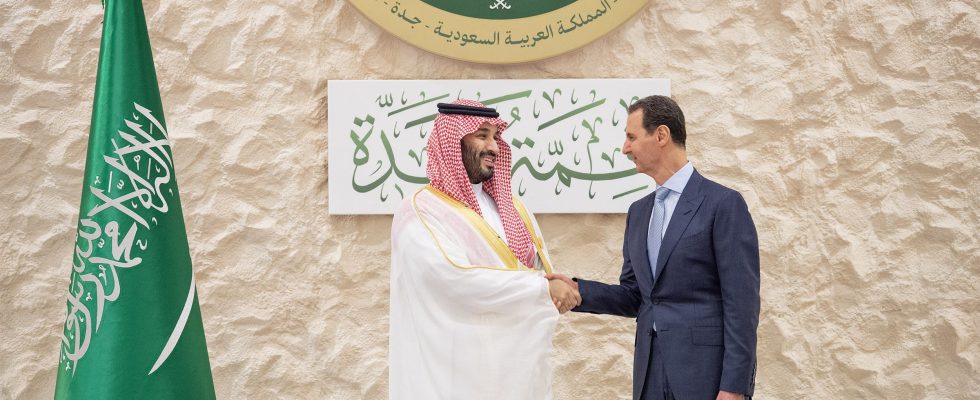He walks proud, straight as an I, and heads towards the Saudi Crown Prince, Mohammed bin Salman. The two men greet each other, exchange a few words and strike a pose in front of the flashes. This May 19, in Jeddah, the Syrian pariah Bashar al-Assad once again becomes a head of state in the eyes of his Arab brothers who had expelled him from their League in 2011.
Declared the winner in a country in ruins, his readmission is only the logical continuation of a long series of rapprochements which accelerated after the earthquake of February 6 in Turkey and Syria. Following in the footsteps of the Emiratis, the Saudis have also chosen to change their strategy vis-à-vis Damascus, after resuming language with the Iranians, through the agreement signed in Beijing in March.
As if the Arab League “abandoned the Syrians”…
This dynamic is a slap in the face for opponents of the regime still there or in exile. “It is not surprising, because we had seen the Arab countries leaning in this direction, but it is a stab in the back of the Syrians,” said Omar Alshogre, of the Syrian Emergency Task Force, an organization of the Syrian opposition based in Washington. This is a way of telling Assad that he can continue to kill his people and that he will eventually be reintegrated into the international community.”
But the master of Damascus may have emerged from his diplomatic isolation, twelve years after the start of the Syrian uprising and 500,000 dead, 110,000 missing and more than 7 million refugees, his software remains the same. “I felt anger, sadness and frustration,” says Syrian activist Wafa Mustafa, whose father, a political opponent, has been missing since 2013. “The normalization of relations with the Assad regime looks like a “betrayal to the countless victims and their families, including mine. It is as if the memories of those who suffered under the atrocities in Damascus were erased and ignored,” she said.
Repression against opponents continues across the country and the Syrian northwest, controlled by the rebellion, continues to be bombarded by loyalist forces and the Russian army. “The reasons that led Arab countries to break their ties with the regime have not changed,” recalls George Sabra, veteran of the Syrian opposition and president of the Syrian National Council. For this opposition alliance based in Turkey, the Arab League’s decision amounts to abandoning the Syrians, leaving them “without official Arab support”.
But the Gulf countries, led by Saudi Arabia, don’t care. They consider that the strategy of isolation has only strengthened the Iranian presence in Syria and made this country a narco-state which threatens the entire region. “This is not so surprising coming from them, given that the United Arab Emirates, Saudi Arabia or Egypt are not democracies, but authoritarian regimes that stick together,” adds Omar Alshogre, former detainee who suffered torture between 2012 and 2015.
The outstretched hand of the Arab countries to Assad was not without guarantees. The question of the return of refugees, but also that of trafficking in captagon, a synthetic drug of which Syria is the main producer, were put on the table. Despite the promises, Bashar al-Assad does not look favorably on the massive return of millions of mainly Sunni Syrians and will probably do nothing to stop the drug trade, managed mainly by his brother Maher and pro-Tehran militias. “It’s wishful thinking, the regime will not give in on the issue of Captagon. This is underestimating Iranian influence and power in Syria,” adds George Sabra.
Towards cooperation with Erdogan?
Driven by these worrying developments, the High Negotiations Committee (HCN), which brings together the seven components of the Syrian opposition, met in Geneva for the first time in more than three years last June. After intense discussions, the HCN called for the resumption of negotiations under the aegis of the UN and considered that the reintegration of the regime into the Arab fold carried the risk of seeing Damascus reject any political solution. “We will only achieve the return of refugees and the resolution of the situation in Syria with the concerted pursuit of a credible political process based on resolution 2254, enacted in 2015, on a change in internal political governance,” insists George Sabra .
But the worst could be yet to come. Because the newly re-elected Turkish President, Recep Tayyip Erdogan, godfather of the Syrian opposition, would be ready for dialogue with Bashar el-Assad, in particular to resolve the question of Syrian refugees, which returned to the forefront during the presidential election of May. “For Turkey, the normalization process is not simply limited to reopening an embassy,” explains Nawar Saban, analyst at the Omran Institute, based in Turkey. “It is a question of national security and border control. Because Ankara is present and influential in Idlib and the North West.”
All eyes are on the West, the last ramparts preventing the full rehabilitation of the Syrian regime. “Certain countries are taking steps in the right direction: the American Congress has passed important laws and will continue to do so, summarizes Omar Alshogre. We must also not forget the cases brought to court against the Syrian regime in Germany and in France, as well as that brought before the International Court of Justice.” The Caesar law, which sanctions any person or entity that invests in Syria, appears today to be the main safeguard against the return of Bashar al-Assad on the international scene.
